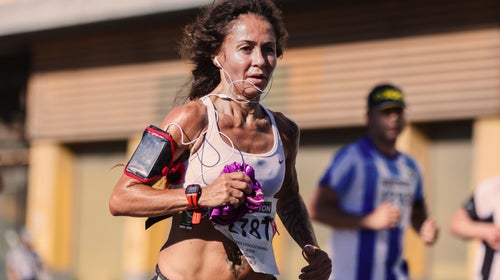If you haven’t run a marathon by your 50th birthday, you may think that opportunity has passed. Think again. “While aging may make it harder to recover from extreme exertion, that doesn’t mean that, with the right training, you can’t tackle the distance for the first time after 50,” says Jay Bawcom, who has coached dozens of senior runners in the , an online program that pairs you with a running coach.
“Certainly folks around this age need to be aware that they’ve got a few more years of wear and tear on their bodies, so there are things to watch out for,” Bawcom says. You should talk to a doctor about any cardiac or musculoskeletal issues before you start training. Assuming you get a clean bill of health, you’re perfectly safe to start training for your first marathon, so long as you do so deliberately, carefully, and with a promise to yourself to listen to whatever your body’s telling you throughout the process.
Here’s how to make it happen.
Set Realistic Expectations
If you’ve been fairly fit your whole life, your 50-year-old self will likely run your first marathon slower than you would have at 30. That’s OK. While it’s all highly individualized, aging can change hormones, metabolism, and other aspects of the body’s physiology that seriously hinder its ability to perform and recover, Bawcom says. All that means is you have to adjust expectations.
Another thing you can do to help your case: Pick the right race. Bawcom recommends “a fast course with simple logistics,” such as the . The race has a smaller field, making organization easier, and a fast, net downhill course. Then there’s temperature. “Heat also seems to impact runners more as they get older, and this can make training for early fall races a challenge since it means doing big miles during the peak of summer,” Bawcom says. If you live in a place with harsh summer temps, try a winter race like the or , which would allow you to clock your 20-milers in milder weather.
Train Longer, Not Harder
When you’re younger, you can usually train for a full marathon safely in 12 to 14 weeks. For an older runner, however, Bawcom suggests setting aside 18 to 20 weeks to add more recovery time in between your longer runs and harder workouts.
As an older first-time marathoner, it’s important that your training runs focus on quality miles. To survive the marathon training cycle, work from either end of the spectrum—focus on shorter runs significantly faster than marathon pace and longer runs significantly slower than marathon pace, Bawcom says. “Trying to do too many long runs at or close to marathon pace or chasing an arbitrary weekly mileage goal can really beat a person up.”
Finally, supplemental workouts like yoga, Pilates, and cycling can really help older athletes. “I worked with an over-50 athlete who was extremely prone to injuries,” Bawcom says, “and he managed to run under 2:50 by running two to three times a week and cycling the rest.”
Eating and Sleeping Are Training, Too
Marathon training at any age is somewhat all-consuming. But when you’re over 50, making certain choices beyond your running is key to getting to the starting line healthy and avoiding wearing down your body completely during the training process.
First, there’s diet. “A lot of runners seem to focus on avoiding certain foods, but diet should be more about inclusion than exclusion,” Bawcom says. “Healthy proteins and fats, foods with high-quality caloric content, and great hydration should all be part of the plan to keep you fueled.”
And then there’s sleep. This is the place where many of my runners fall short, Bawcom says. “When you’re trying to balance running with the rest of life’s demands, you often cut corners in rest and recovery, but that’s a big mistake.” According to Bawcom, you’re often better off dropping a mile from your run—and, in doing so, reducing a bit of stress—than you are getting up when your body’s telling you to sleep a few minutes longer.


